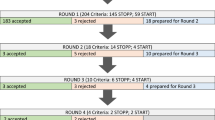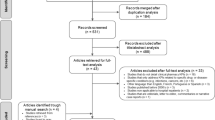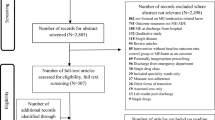ABSTRACT
BACKGROUND
The epidemiology of adverse drug events (ADEs) and medication errors has received little evaluation outside the U.S. and Europe, and extrapolating from these data might not be valid, especially regarding selecting and prioritizing solutions.
OBJECTIVE
To assess the incidence and preventability of ADEs and medication errors in Japan.
DESIGN
The Japan Adverse Drug Events (JADE) study was a prospective cohort study.
PATIENTS
A cohort of 3,459 adults admitted to a stratified random sample of seven medical and eight surgical wards and three intensive care units in three tertiary care hospitals over 6 months.
MAIN MEASURES
We measured ADE and medication error rates from daily reviews of charts, laboratories, incident reports, and prescription queries by on-site reviewers; presence of a signal was considered an incident. Two independent physicians reviewed incidents to determine whether they were ADEs or medication errors and to assess severity and preventability.
KEY RESULTS
We identified 1,010 ADEs and 514 medication errors (incidence: 17.0 and 8.7 per 1,000 patient-days, respectively) during the study period. Among ADEs, 1.6%, 4.9% and 33% were fatal, life-threatening and serious, respectively. Among ADEs, 14% were preventable. The rate per admission was 29 per 100 admissions, higher than in U.S. studies because associated with of the long length of hospital stay in Japan (mean, 17 days).
CONCLUSIONS
The epidemiology and nature of ADEs and medication errors in Japan were similar to other countries, although more frequent per admission. Solutions that worked in these countries might thus improve medication safety in Japan, as could shortening hospital length of stay.

Similar content being viewed by others
REFERENCES
Morimoto T, Gandhi TK, Seger AC, Hsieh TC, Bates DW. Adverse drug events and medication errors: detection and classification methods. Qual Saf Health Care. 2004;13(4):306–314.
Leape LL, Brennan TA, Laird N, et al. The nature of adverse events in hospitalized patients. Results of the Harvard medical practice study II. N Engl J Med. 1991;324(6):377–384.
Jha AK, Prasopa-Plaizier N, Larizgoitia I, Bates DW. Patient safety research: an overview of the global evidence. Qual Saf Health Care. 2010;19(1):42–47.
Bates DW, Cullen DJ, Laird N, et al. Incidence of adverse drug events and potential adverse drug events. Implications for prevention. ADE Prevention Study Group. Jama. 1995;274(1):29–34.
Gandhi TK, Weingart SN, Borus J, et al. Adverse drug events in ambulatory care. N Engl J Med. 2003;348(16):1556–1564.
Kaushal R, Bates DW, Landrigan C, et al. Medication errors and adverse drug events in pediatric inpatients. Jama. 2001;285(16):2114–2120.
Lazarou J, Pomeranz BH, Corey PN. Incidence of adverse drug reactions in hospitalized patients: a meta-analysis of prospective studies. Jama. 1998;279(15):1200–1205.
Bates DW, Spell N, Cullen DJ, et al. The costs of adverse drug events in hospitalized patients. Adverse drug events prevention study group. Jama. 1997;277(4):307–311.
Ogilvie RI, Ruedy J. Adverse drug reactions during hospitalization. Can Med Assoc J. 1967;97(24):1450–1457.
Hurwitz N, Wade OL. Intensive hospital monitoring of adverse reactions to drugs. Br Med J. 1969;1(5643):531–536.
Smidt NA, McQueen EG. Adverse drug reactions in a general hospital. N Z Med J. 1973;78(494):39.
Morimoto T, Fukui T, Lee TH, Matsui K. Application of U.S. guidelines in other countries: aspirin for the primary prevention of cardiovascular events in Japan. Am J Med. 2004;117(7):459–468.
Bates DW, Larizgoitia I, Prasopa-Plaizier N, Jha AK. Global priorities for patient safety research. BMJ. 2009;338:b1775.
Hug BL, Witkowski DJ, Sox CM, et al. Adverse drug event rates in six community hospitals and the potential impact of computerized physician order entry for prevention. J Gen Intern Med. 2010;25(1):31–38.
Anbacken O. Japanese hospitals–culture and competition: a study of ten hospitals. Int J Health Plann Manage. 1994;9(1):87–101.
Muramatsu N, Liang J. Hospital length of stay in the United States and Japan: a case study of myocardial infarction patients. Int J Health Serv. 1999;29(1):189–209.
Nomura H, Nakayama T. The Japanese healthcare system. BMJ. 2005;331(7518):648–649.
Bates DW. Using information technology to reduce rates of medication errors in hospitals. BMJ. 2000;320(7237):788–791.
Bates DW, Gawande AA. Improving safety with information technology. N Engl J Med. 2003;348(25):2526–2534.
Mycyk MB, McDaniel MR, Fotis MA, Regalado J. Hospitalwide adverse drug events before and after limiting weekly work hours of medical residents to 80. Am J Health Syst Pharm. 2005;62(15):1592–1595.
ACKNOWLEDGMENTS
We are indebted to Ms. Makiko Ohtorii, Ms. Ai Mizutani, Ms. Kimiko Sakamoto, Ms. Eri Miyake, Ms. Takako Yamaguchi, Ms. Yoko Oe, Ms. Kyoko Sakaguchi, Ms. Kumiko Matsunaga, Ms. Yoko Ishida, Ms. Kiyoko Hongo, Ms. Masae Ohtani, Ms. Yasuko Ito, Ms. Ayumi Samejima, and Ms. Shinobu Tanaka for their assistance.
This study was funded by grants 17689022 and 18659147 from the Ministry of Education, Culture, Sports, Science and Technology (MEXT) of Japan, and the Pfizer Health Research Foundation.
Presented in part at the 26th International Conference of the International Society for Quality in Health Care, Dublin, Ireland. October 13, 2009
Conflict of Interest
None disclosed.
Author information
Authors and Affiliations
Corresponding author
Additional information
This study was funded by grants 17689022 and 18659147 from the Ministry of Education, Culture, Sports, Science and Technology (MEXT) of Japan, and the Pfizer Health Research Foundation.
Rights and permissions
About this article
Cite this article
Morimoto, T., Sakuma, M., Matsui, K. et al. Incidence of Adverse Drug Events and Medication Errors in Japan: the JADE Study. J GEN INTERN MED 26, 148–153 (2011). https://doi.org/10.1007/s11606-010-1518-3
Received:
Revised:
Accepted:
Published:
Issue Date:
DOI: https://doi.org/10.1007/s11606-010-1518-3




